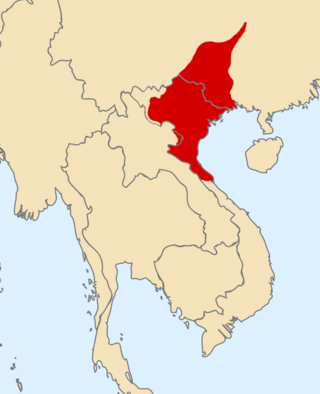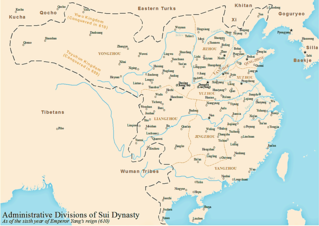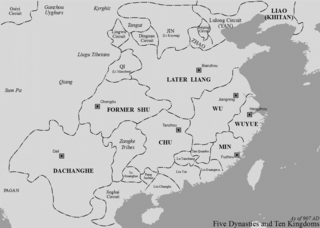Notable people with the surname Khúc
- Khúc family, a session of leaders who challenged Tang rule over Vietnam.
- Khúc Thừa Dụ, the head of the Khúc family
- Khúc Hạo
- Khúc Thừa Mỹ
Khúc is a Vietnamese surname.

Year 905 (CMV) was a common year starting on Tuesday of the Julian calendar.
Johnson is a surname of Anglo-Norman origin meaning "Son of John". It is the second most common in the United States. As a common family name in Scotland, Johnson is occasionally a variation of Johnston, a habitational name.

Trịnh Công Sơn was a Vietnamese musician, songwriter, painter and poet. He is widely considered to be Vietnam's best songwriter. His music explores themes of love, loss, and anti-war sentiments during the Vietnam War, for which he was censored by both the southern Republic of Vietnam and the Socialist Republic of Vietnam. Many performing artists, most notably Khánh Ly, Trinh Vinh Trinh, and some overseas singers such as Tuan Ngoc, Le Quyen, Le Thu, and Ngoc Lan, have gained popularity in their own right from covering Trịnh's songs.

The Ngô dynasty, officially Tĩnh Hải quân, was a semi-independent Vietnamese dynasty from 939 to 968. The dynasty was founded by Ngô Quyền, who led the Vietnamese forces in the Battle of Bạch Đằng River against the Chinese Southern Han dynasty in 938.
Cho is a Korean family name, historically Royal family name in Korea. As of 2000, there were 1,347,730 people by this surname in South Korea, about 1% of the total population. The name may represent either of the Hanja 趙 or 曺.

The Khúc family or Khúc clan was a succession of native leaders who ruled over Tĩnh Hải quân during the late Tang dynasty until the Five Dynasties period.

The Third Era of Northern Domination refers to the third period of Chinese rule in Vietnamese history. The era starts from the end of the Early Lý dynasty in 602 to the rise of the local Khúc family and other Viet warlords in the early 10th century, finally ending in 938 after the defeat of the Southern Han armada by the Viet leader Ngô Quyền. This period saw three Chinese imperial dynasties rule over what is today northern Vietnam: Sui, Tang and Wu Zhou. The Sui dynasty ruled northern Vietnam from 602 to 618, and briefly reoccupied central Vietnam in 605. The successive Tang dynasty ruled northern Vietnam from 621 to 690, and again from 705 to 880. Between 690 and 705, the Tang dynasty was briefly interrupted by the Wu Zhou dynasty which maintained Chinese rule over Vietnam.
Qureshi is a surname common in some Muslim countries.
Zlatarić is a surname. Notable people with the surname include:

Khúc Thừa Dụ or Khúc Tiên Chủ (830–907) was a jiedushi of Tĩnh Hải quân, nominally under the Chinese Tang dynasty, in the early 10th century.

Khúc Hạo was the Vietnamese self-declared jiedushi of northern Vietnam from 907 to 917 succeeding his father Khúc Thừa Dụ.
You is the pinyin romanization of several Chinese family names including 尤 Yóu, 游 Yóu, 㳺 Yóu, 犹 Yóu, 由 Yóu, 右 Yòu, 幽 Yōu, etc. Among these names, 尤 Yóu and 游 Yóu are relatively common. 尤 Yóu is the 19th surname in Hundred Family Surnames.
Tôn Thất is a two-character Vietnamese compound surname, originating from the Nguyễn dynasty. It is the surname for members of the imperial family that were not direct first-born descendants of the Emperor, and therefore considered collateral relatives of the Nguyễn dynasty.
Tu is a Chinese surname, and the 279th family name in Hundred Family Surnames. Tu is another Chinese surname.
The Chinh phụ ngâm is a poem in classical Chinese written by the Vietnamese author Đặng Trần Côn (1710–1745). It is also called the Chinh phụ ngâm khúc (征婦吟曲), with the additional -khúc emphasizing that it can be performed as a musical piece not just read as a plain "lament".
Đặng Trần Côn was the author of the Chinh phụ ngâm a masterpiece of chữ Hán literature of Vietnam.
Khúc Thừa Mỹ was a self-declared jiedushi of Tĩnh Hải quân during the later part of the Third Chinese domination of Vietnam, when China entered the chaotic Five Dynasties period. He succeeded his father Khúc Hạo and tried to maintain northern Vietnam's autonomy. His rule was officially recognized by the Later Liang, thus he came to conflict with Liu Yan, the ruler of Southern Han. The Southern Han invaded in 930, capturing the capital Đại La with no resistance, and Khúc Thừa Mỹ was taken to Canton, where he was placed under comfortable house arrest. Chinese rule in Vietnam was thereby reestablished.

Tĩnh Hải quân or Jinghai Circuit, also known as Annam (安南), was an administrative division of the Tang dynasty of China administered by Chinese governors, which then later became a quasi-independent regime ruled by successive local Vietnamese warlords and monarchs. It was centered around what is now northern Vietnam from 866 to 967 during the late Tang period and lasted until the late Five Dynasties and Ten Kingdoms period when Đinh Bộ Lĩnh established the Đinh dynasty.
Ó hAonghusa is the surname of at least two distinct Gaelic-Irish families. It is now anglicised as Hennessy and Hennessey.
Qu. While the character 曲 is often pronounced Qǔ in Modern Mandarin, the surname is pronounced Qū in the first tone. It is written Khúc in Vietnamese.